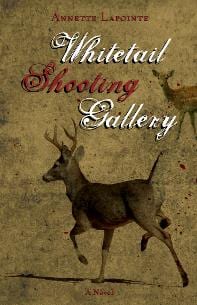Whitetail Shooting Gallery, Annette Lapointe’s follow-up to her Giller Prize-nominated first novel, Stolen, is the story of Jennifer and Jason, cousins living in rural Saskatchewan.
Each chapter shifts between Jennifer’s perspective and Jason’s, an interesting twist given that the characters take turns avoiding and stalking each other. To further complicate the story line, the chapters take turns going back and stepping forward, so that each character’s story is part reinterpretation, part revelation. And, even with this doubling over, the actual turn of events is often difficult to assemble as Lapointe’s characters allude and evade as often as they explain, making the whole book feel like a game of hide-and-go-seek. But it’s a really great game, played in the dark, where the only thing you can see for sure is your breath in the cold.
The meat of this story is in the details. Whitetail Shooting Gallery is visceral and gut-punching. As the cousins move from the world of forts and werewolves to hockey, horses and first kisses with boys and girls, Lapointe seems to revel in demonstrating how all these things are related. Lapointe’s characters are tough; they wrestle, pinch and bite as much as they talk. In one early scene, Jennifer strips down with her friend Donna, covers her skin in ballpoint pen marks, and tracks her cousin in the pasture, feeling as much wolf as girl. Lapointe’s descriptions of Jason’s rookie hockey-team initiations read like proper Prairie erotica, as boys dart around hay bales, drunk, heads shaved, horny.
In between these body blows, Lapointe’s analysis of Canadian communities, culture and landscape is dead-on, including this gem about Jason’s parents, whom she describes, in their West Coast youth, wearing “loose clothes with messy, shaggy hair, looking like the hippy diagram people in The Joy of Sex.”
In recommending this book, I am asking, pleading, that you look past the cover, which is dark, grainy and impossible to read. There is nothing about the design of this book that does any justice to the content inside. Which is a shame, because it’s a great read.

 Why you can trust Xtra
Why you can trust Xtra


